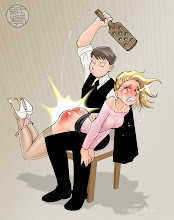Entry for August 01, 2008 Premenstrual Syndrome notes, nonfiction
The following are notes on Premenstrual Syndrome, also known as PMS. Take it for what it's worth, and as with anything you read on the net, please consult a doctor in real life if you have questions.
General Considerations
PMS covers a broad range of symptons that occur clinically and can involve amost every organ system.It affects an estimated 10-80% of menstruating women in the US.Symptoms begin after ovulation, peak prior to menstruation and stop/subside after mense begins.Some women report symptoms from the onset of puberty. The majority develop it in later years following following the alterations of the hormonal cycle-after stopping birth control pills or following pregnancy.
It can be loosely classified into four PMT (premenstrual type) groups: PMT-Anxiety, PMT-Craving, PMT-Depression, PMT-Hyperhydration, and a person may overlap categories.
Eitiology (refers to the cause or causes of the problem) includes the following:
Unknown
Alterations of normal estrogen and progesterone patterns during the menstrual cycle- increased estrogen levels and decreased progesterone levels. Increased estrogen levels stimulate the renin-angiotensin system, which increases aldosterone production, which promotes sodium and water retention.
Alterations in systemic levels of prostaglandin type E1 and E2. Increased E2 leads to inflammation, decreased E1 decreases anti inflammatory capability. This results in more pain and swelling.
Vitamin and mineral deficiencies. The Most common problem is with magnesium and vitamin B6. Dopamine functions as an aldosterone antagonist (meaning it works against the aldosterone), and dopamine production relies on vitamin B6 and magnesium for cofactors.
Hypothyroidism, which causes a decrease in the livers ability to metabolize estrogen.
Liver malfunction. It needs vitamin B6 and magnesium.
Nutritional habits, slow gut transit time, chronic constitpation.
Stress levels.
Possible 'risk' factors:
Over 30
Parous
Stress
Poor nutrition/eating habits
Lack of exercise
Intolerance to oral contraceptives
Overweight
Signs and Symptoms
PMT-A. Most likely due to greatly increased estrogen levels, and decreased progesterone levels.
Nervous tension
Mood swings
Irritability
Anxiety
Insomnia
PMT-C. Theory is that sugar baseline has increased.
Headache
Craving for sweets
Increased appetite
Heart pounding
Dizziness/fainting
Fatigue
PMT-D. Theory is that there is an altered progesterone level, because it helps to serve as a CNS regulator.
Depression
Forgetfulness
Crying
Confusion
PMT-H. Due to increased aldosterone levels. The inhibiting pathway needs vitamin B6 and magnesium.
Weight gain
Swelling of extremities
Breast tenderness
Abdominal bloating
Diagnosis
See a doc, and rule out serious causes, such as tumors, fibroids, and endometriosis (Endometriosis is a common medical condition characterized by growth beyond or outside the uterus of tissue resembling endometrium, the tissue that normally lines the uterus.Affecting an estimated 89 million women of reproductive age (those who have yet to become pregnant) around the world, endometriosis occurs in one in every five women.)
Have your hormone levels checked (specificaly check for hypothyroid, but also look for lowered but 'normal' levels.
A vitamin/mineral assesment
Daily record of symptoms for two or three months
Treatment considerations
Vitamin B6, up to 500 mg daily for 3 months
Magnesium, 400 mg daily
Avoid/limit red meats
Avoid/limit egg yolks
Avoid/limit dairy products
Avoid/limit fried foods
Avoid/limit refined sugars- it causes increased excretion of Vitamin B6
Avoid/limit alcohol
Avoid/limit caffeine
Avoid/limit saltMuscle therapy
Chiropractic adjustments (primarily to decrease sympathetic tone).
Neurolymphatics
Primrose oil, 500 mg three times a day.
Needs zinc, biotin, vitamin C, B6, and magnesium.
Red raspberry tea
Vitamin E
Regular excercise
Reassurance that she is not crazy
Progesterone cream, applied to wrists, behind ears, and labia
Green leafy veggies
Best of luckAngie
Subscribe to:
Post Comments (Atom)

No comments:
Post a Comment